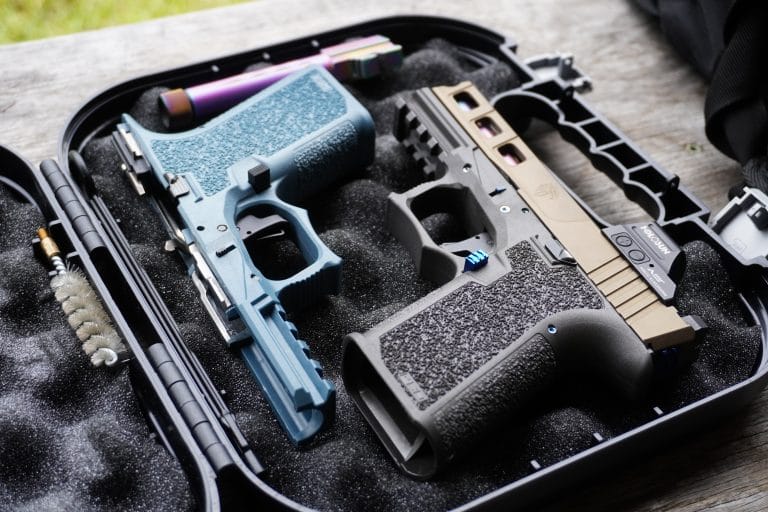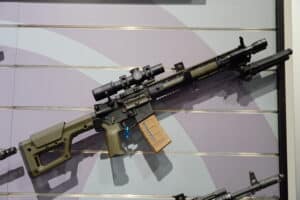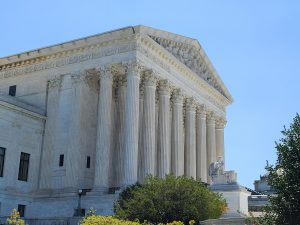One of the nation’s leading sellers of homemade gun kits was dealt a blow in court this week.
Baltimore city officials announced Wednesday that the Nevada-based unfinished firearm parts manufacturer Polymer80 has agreed to pay $1.2 million to settle claims that guns made with its parts, which opponents label “ghost guns” because they lack traceable serial numbers, have been fueling violent crime in the city. The settlement terms will also permanently prohibit Polymer80 from advertising in Maryland or selling any of its products to Maryland residents, including those who attempt to purchase them in other states.
“This settlement – and the statement it sends about the harmful impact of these ghost guns – is a critical victory for the effort to confront gun violence in our communities,” Baltimore Mayor Brandon Scott (D.) said in a press release.
The settlement marks yet another legal setback for the most recognizable unfinished firearm parts maker in the country. The city called the settlement “the most expansive and strictest injunctive terms so far” of any lawsuit filed against Polymer80 to date. It comes on the heels of similar settlements reached in lawsuits filed by Washington, D.C., and Los Angeles, California. The continued success of these suits suggests they have become an effective tactic in city officials’ and gun-control advocates’ efforts to eliminate at-home gun building.
The settlement means that Polymer80 has or will soon have to pay more than $10 million to various local governments and restrict its business in those jurisdictions. It was ordered to pay $4 million to Washington D.C. in August 2022 after a judge found that it was “falsely and misleadingly” advertising “illegal firearms” in the District. In May 2023, it entered into a $5 million settlement with Los Angeles and agreed to stop selling its products without background checks statewide. A fourth lawsuit, filed by the City of Philadelphia last July, is still ongoing and seeks a similar judgment against Polymer80.
In 2022, the legal arm of the Brady Center to Prevent Gun Violence partnered with Baltimore to bring Polymer80 to court. Philip Bangle, the group’s senior litigation counsel, called the settlement a win in “the fight for gun industry accountability.”
“Polymer80 fueled gun violence in the city by selling ghost guns to subvert lifesaving Brady Background Checks,” Bangle said. “This settlement will staunch the flow of these weapons and force Polymer80 to contribute to healing the City of Baltimore for the injuries and trauma their products inflicted on the city.”
Polymer80 did not respond to a request for comment.
The company has traditionally focused on providing unfinished firearm components as well as the tools needed for do-it-yourself gun makers to assemble them into completed firearms at home. Since the parts they make require additional machining to complete before they can be built into working guns, they have fallen outside most federal and state definitions of firearms. The practice has come under increasing scrutiny from lawmakers and gun-control advocates in recent years. President Joe Biden has attempted to ban selling unfinished parts alongside the tools used to finish them in kits designed to make the home-building process easier, though that effort has now been found unconstitutional by at least one federal appeals court and will likely be litigated at the Supreme Court.
Advocates argue at-home gun building is part of the American tradition, and unfinished parts have never been regulated up to this point in history. Opponents argue the lack of regulation allows minors and people with serious criminal records to buy unfinished parts without going through a background check and build functional firearms out of them.
Baltimore and Brady sued Polymer80 and a local gun retailer that sells its products in June 2022, just as Maryland’s ban on unserialized frames and receivers took effect. The suit claimed that the number of homemade “ghost guns” seized by Baltimore Police had steadily increased every year since 2019 and that 91% of the recovered guns were manufactured by Polymer80.
As part of its settlement, the company agreed to provide Baltimore with quarterly reports documenting all of its sales to purchasers in neighboring states moving forward. The city’s suit against Hanover Armory, the local retailer accused of selling Polymer80 kits without background checks, is still ongoing and is set to go to trial in October.






